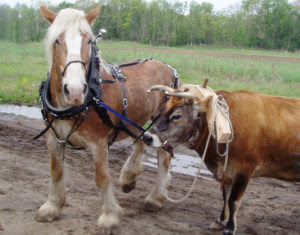Unequally Yoked
By Mike Riccardi - Posted at The Cripplegate:
“Do not be unequally yoked with unbelievers.”
– 2 Corinthians 6:14, ESV –
Over the past two weeks, we’ve been considering who the faithful Christian minister may properly partner with in ministry. Two weeks ago we briefly surveyed the history of the ecumenical movement in order to vividly illustrate the terrible consequence of disobedience to Scripture on this matter. Last week we oriented ourselves to the key text I’m focusing on, 2 Corinthians 6:14-7:1, considering the context in which it comes. I won’t rehash all of that here, so if you’ve missed it please click over to read those two introductory posts [http://thecripplegate.com/author/mike-riccardi/].
But today we come to consider the actual prohibition that Paul gives. It comes in 2 Corinthians 6:14: “Do not be unequally yoked with unbelievers.” Now, this term “to be unequally yoked with,” is a translation of the compound word heterozugeo, which is made up of the familiar term heteros—“different”—and the word zugos, which is the word for “yoke.” This is an agricultural image. A yoke is a wooden crosspiece that a farmer would fasten over the necks of animals, which is then attached to a plow or a cart that animal would pull. There’s a double yoke, which sits on the necks of two animals as they plow side by side in the same direction. And the idea is: “Don’t get into a yoke with an animal that requires a different kind of yoke than you do,” or, “Don’t yoke together two different animals who are going to be pulling in two different directions.”
And the imagery that Paul draws from comes from the Old Testament. The only other time Scripture uses the term heterozugeo is as an adjective in the Greek translation of Leviticus 19:19, where God commands Israel: “You shall not breed together two kinds of your cattle; you shall not sow your field with two kinds of seed, nor wear a garment upon you of two kinds of material mixed together.” When set alongside the prohibitions to not mix seeds or mix fabrics, this command is seen clearly to prohibit the cross-breeding of animals of different kinds. If you translate the Septuagint literally into English, it says, “You shall not breed your cattle with an animal that uses another yoke.” The same concept is repeated in Deuteronomy 22:10: “You shall not plow with an ox and a donkey together.” In other words, don’t put an ox and a donkey in the same yoke and expect them to pull that plow in a harmonious, cooperative way. They have different levels of strength, different manners of walking, and very different constitutions—the donkey, of course, being much more stubborn than the ox! These two different kinds of animals are a mismatched pair, and it would be impossible for them to plow together in an effective manner.
By using this imagery, Paul is saying the same thing about partnership between believers and unbelievers. Just as yoking together two fundamentally different kinds of animals will result in incongruity and discord, so also are believers and unbelievers two fundamentally different “breeds”—fundamentally different kinds of people. Any intimate association or spiritual partnership between them will eventually only result in dissonance and difficulty. Believers and unbelievers are moving in different directions; we live in two different worlds; we’re energized by different powers, and motivated by different passions. To partner them together and expect them to plow in the same direction is ludicrous, and will only end in spiritual disaster.
Read more here.




